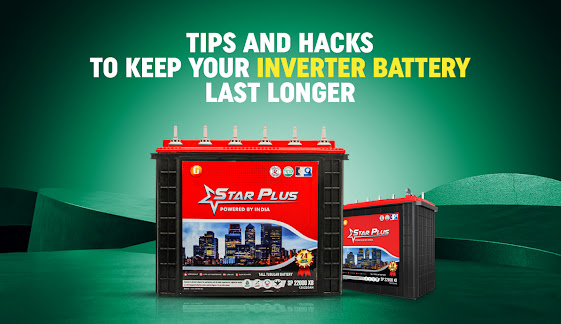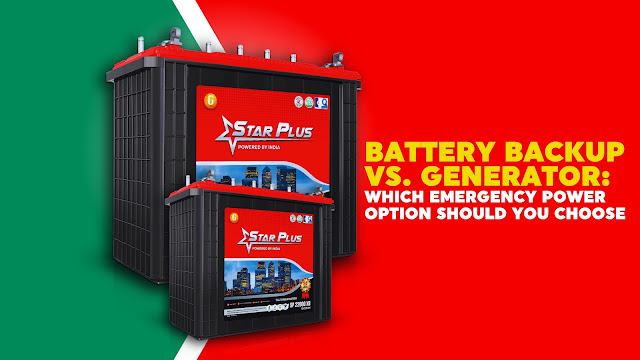An inverter is a rechargeable battery that stores and supplies electricity during power outages. It works in conjunction with an inverter that converts stored DC power into AC electricity, the type of electricity most appliances use.
An inverter with a battery is critical in providing an uninterrupted power supply during blackouts or when grid power seems unavailable. They ensure the continuity of operations for critical devices, such as fans, lights, and electronic equipment, in homes, offices, and industrial settings.
Why Inverter Batteries Are Essential for Reliable Power Backup?
Inverter batteries are crucial, as it provide immediate backup power, preventing disruptions to daily activities and business operations.
They provide peace of mind by maintaining critical services, such as medical equipment and communication devices, which remain operational during emergencies.
In regions prone to frequent power cuts or unreliable electricity supply, inverter batteries provide a dependable backup solution, ensuring consistent productivity and comfort.
Understanding Different Types of Inverter Batteries
Inverter batteries are critical components of a UPS system. They store electrical energy and provide it during power outages by ensuring a seamless transition from the primary power source to the backup inverter system.
There are different types of inverter batteries available on the market, each with its benefits.
Flat Plate Batteries
Flat plate batteries are a common type of battery used in inverters. They generally consist of lead-acid cells and are renowned for their affordability. Its internal structure primarily features flat lead plates submerged in an electrolyte solution. They are easy to maintain and are suitable for smaller inverter setups. However, they do have a shorter lifespan compared to other battery types and do require more frequent replacements in the long run.
Applications
Flat plate batteries are suitable for small-scale residential inverter systems with low to moderate power requirements.
Tubular Batteries
Tubular batteries are the best choice for inverter systems in Nigeria. Its internal structure features tubular positive plates that are more robust and long-lasting than flat plates. Its design enhances the overall lifespan of the battery. These batteries are renowned for their deep cycling capability, making them an ideal choice for areas prone to frequent power outages.
Applications
Tubular batteries are suitable for both residential and commercial applications with moderate to high power requirements. A 220Ah inverter with a battery is a reliable choice for locations with an inconsistent power supply.
Gel Batteries
Gel batteries generally utilise a gel electrolyte, which is a semi-solid substance. This type of feature eliminates the possibility of acid leakage, making it safer and more environmentally friendly. They are maintenance-free and have a prolonged service life as compared to flat plate batteries. They seemed more expensive and had a lower discharge rate.
Applications
Gel batteries are another type of inverter battery that is suitable for places where maintenance remains a challenge. It consists of remote areas and is ideal for applications where safety and environmental concerns are a priority.
AGM (Absorbent Glass Mat) Batteries
AGM batteries are a unique type of maintenance-free option. They generally use a fibreglass mat to contain the electrolyte, enhancing their resistance to vibration and shock. AGM batteries are popular for their high discharge rates and are suitable for unique types of applications that require quick bursts of power.
Applications
AGM batteries are commonly used in backup power systems for essential applications, such as data centres and hospitals.
Lithium-ion Batteries
Lithium-ion batteries are new in the battery market for inverters. They are renowned for their high energy density, longer life cycle, and compact size. They are more expensive than traditional lead-acid batteries.
Applications
Lithium-ion batteries are more suitable for high-end inverter systems and are popular for residential and commercial applications that require reliable and compact power solutions.
Tubular Inverter Batteries are The Perfect Choice for Nigeria
Among various types of inverter batteries, tubular batteries stand out as an excellent choice for Nigeria's geographical location. The reasons are as follows.
Increased Durability
The Nigerian power grid is renowned for its inconsistency, characterised by frequent voltage variations and power fluctuations. A tubular inverter battery is an inverter with a battery that is designed to withstand these challenges. Its robust construction and specialised materials make it resilient against the harsh operating conditions, ensuring that it can deliver consistent power during frequent voltage changes.
Improved Charging Efficiency
Tubular inverter batteries accept high-voltage energy, allowing for faster charging. In a country like Nigeria, frequent power fluctuations seem familiar; these occurrences are, by nature, invaluable. It can quickly absorb charge from the grid or alternative power sources to maximise their utilisation and reduce downtime between power outages, ensuring you have reliable backup power when it is needed most.
Reduced Energy Loss
These types of inverter batteries do come with a low self-discharge rate. It comes with a significant advantage. The tubular battery, marketed by Star Plus Battery, is made up of specialised materials that minimise energy loss due to internal chemical reactions, ensuring that the stored energy remains available when needed. This is particularly critical during extended power outages, as the battery retains a greater portion of its charge.
Longer Lifespan and Less Maintenance
Nigeria often faces difficulties with the maintenance and replacement costs associated with inverter batteries. Star Plus Battery comes with 12-volt and 220Ah tubular batteries. It has a significantly longer lifespan, with an average lifespan of between 7 and 8 years. It means fewer replacements and lower maintenance costs as compared to other battery types. Therefore, it is a cost-effective choice in the long run.
Bottom Line
When it comes to selecting the ideal inverter with a battery for Nigeria, tubular batteries excel in several aspects, as it is critical for a reliable and cost-effective backup power solution. Its durability, longer lifespan, and suitability for renewable energy systems make it a perfect choice for Nigerian households and businesses. Star Plus Battery is the leading distributor and seller of tall tubular batteries in Nigeria. The batteries are known for their superior performance and budget-friendly prices. If you are planning to buy a tubular inverter battery, then consider Star Plus tubular batteries for your power needs.








